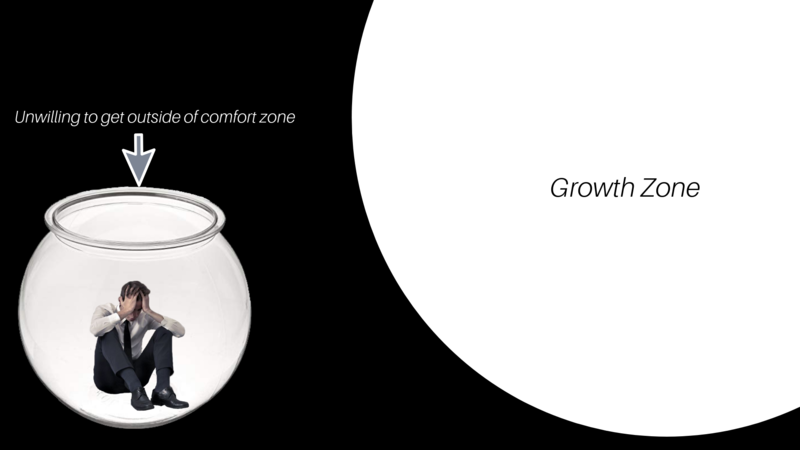Have you ever noticed that often people complain about their business, their relationship or their health but they simply don’t do anything about it?
For example, friends or family might complain that:
- They don’t make enough money but they refuse to work harder, sell more or get help to see where they are struggling.
- Their relationship is failing but they are not able to find the time to experience distraction free dates.
- They are unhappy with how they look but unable to stop eating snacks all day.
In other words, they are simply unable or unwilling to get outside of their comfort zone in order to initiate the outcomes they so desperately desire.

One quote that has really impacted the way I think comes from Albert Einstein and goes like this:
“Insanity means doing the same thing over and over again and expecting a different outcome.”
But is this really true?
Sure, often we do things that are so obviously not working (at least to outsiders watching us).
We cling to them as if our life depended on them.
That can be very foolish!
However, recently I read about Hebb’s law that really got me wondering if this quote really is accurate.
Hebb’s law states:
“Neurons that fire together wire together”.
What this means is that our brain cells build connections when we think specific thoughts. And the more we repeat these thoughts, the stronger the connection becomes until they are “wired” together.
In fact, this is how we learn new things:
Say for example you want to learn to play tennis, and you are working on your forehand, then this is what you would probably do:
Your coach would make you repeat hitting the same shot until you finally got it right.
And once that happened, you have only completed the first part of mastery;
To really improve, you would have to repeat that shot so many times until it becomes automated and you would be able to hit a clean forehand with closed eyes.
At that moment the neurons that control your movement for your forehand would have finally been wired together.
What Hebb’s law is really saying is that by repeating the same action time and again, we become good at something.
Let me share a metaphor that might help you understand how this works.
Think of a man walking towards a hut that lies in the middle of natural fields
The first time he makes this walk, it might be quite uncomfortable to fight his way through all the mud and stones.
However, if he walks the same way every day, his footprints will eventually create a path that will make the journey much easier from day to day.

In the same way, the man creates a path to the hut, we create brain connections between different parts of the brain when we learn something new.
From tying your shoelaces, driving a car or becoming a world-class athlete- it is the process of repetition that allows us to master the core skills of life.
But here comes the tricky part:
Say you want to become a great blogger, so you decide to write 1,000 words a day.
In the beginning, you might be super motivated and energized.
However, this initial boast does not always last.
Often ambitious individuals who want to build their own following:
- Struggle to find new topics to write about.
- Never really improve their writing skills;
- Aren’t able to really grow their email list significantly…
They become impatient.
Eventually, they believing that they can ever run a successful blog, let alone make money from it.
And guess what most people do then?
They stop!
The sad truth is often we are so much closer to our goals than we think;
The reason is simple:
Consistency allows us to eventually tap into one of the most fascinating forces:
The power of compounding where incremental and invisible efforts turn into massive results.
If we persist, all of a sudden:
- Writing 1,000 words a day on a specific topic makes us an recognized expert with a huge following.
- Working out three times a week makes you look so good people start complimenting you.
- Saving ten percent of our money turns into a real fortune that makes you believe in your own financial freedom.
So let’s summarize:
Doing certain mistakes over and over again is foolish.
Sometimes though, repetition is the secret spice that will make you more successful and happy!
This is especially so when we are trying to build habits that we know are good for us.
Even if repetition can feel a little bit insane!
But be warned:
Repetition can be painful!
It can also be boring!
And it can feel hopeless at times!
Here’s why:
Our initial results stay unnoticed.
It’s like when you plant the seed of a bamboo tree:
- After one year you won’t see much;
- After year two you still won’t see much;
- After year three you won’t see much either;
- And after year four you will still not see anything!
But after year five something crazy happens.
In the same way, our habits compound from nowhere into extraordinary results, we miraculously see a powerful tree that is almost 25 meters high.
This is the ONE secret top performers understand that so many of us get wrong:
Doing the same thing over and over again- even when boring- can lead to breakthrough results.
So how can we stay patient during all the years of hustling and waiting?
I will be the first to admit:
Building powerful habits can be extremely challenging, as it goes against our nature to be patient and work towards long term outcomes.
As humans, we are programmed to seek instant gratification.
We also have the gift that we can manufacture thoughts and feeling that serve us, especially when we are working towards long-term outcomes.
Nevertheless, there are things we can do to make it easier for us to persist.
Let me share with you one simple trick that has helped me overcome my impatience for immediate results on many occasions:
When I set a long-term goal, I look for a trait that will get me there.
For example:
- If I want to create a successful blog, that trait might be consistent writing.
- If I want to get into the best shape of my life, I might commit to going to the gym consistently.
- if I want to learn something new, I might commit to consistent reading.
Next, I create weekly achievement benchmarks so that I can reward myself at the end of each week in case I met them.
Here is what happens when I do that:
- After writing 1,000 words a day for every week I might treat myself to a nice dinner with my wife.
- Or after working out 4 times a week, I might celebrate by rewarding myself with a massage.
- Or after reading a book within a week I might reward myself by going to the movies with a friend.
By celebrating our mini-wins, we trick our brain to think that we have accomplished our goals, and this will help us feel motivated for the upcoming week.
Overtime, we build an upward spiral of little wins that will eventually trigger the kind of bigger and more exciting outcomes that seriously excite us.
All of a sudden, we become the kind of person who can build habits that serve long-term goals, and everything changes.
We experience more success, more health and more joy!
Of course, I realize we can get more sophisticated about building habits.
We also want to refine them from time to time.
But I am pretty sure that building consistency is often the real starting point to building lasting breakthroughs.
And to achieve little wins, we have to get comfortable with doing the same thing over and over again, until we finally experience a different outcome!
Mental Exercise
Now if you are like me, you probably have quite a few habits you would love to incorporate into your life.
Many of them you probably have already tried in the past, but gave up before seeing the fruits of your labor.
If that is true, I’d love you to try this and let me know how it goes.
Pick one habit that if done consistently, will inevitably help you move towards an important professional goal.
This might mean writing on a daily basis, improving an existing skill or making sales pitches.
Choose something that is not too difficult, and that you feel confident you can achieve, even if it will not produce any visible changes to your life immediately.
Whatever it is, schedule at least 5 minutes of this one activity on a daily basis for the next one month. The key is to follow through every day, with no exceptions!
And if you do fail to follow through, make sure you re-commit immediately so that you are back on track. It is when we miss a few times in a row that it becomes very hard to rebuild a habit.
That was the easy part!
Now let’s talk about celebrations:
For every week that you manage to consistently repeat your habit daily, I want you to reward yourself.
It does not need to be something fancy or expensive, but it does need to make you feel like you achieved something important.
And it should be fun!
That’s it.
So if you are ready to pursue a long-term goal, just give this a try:
Pick a habit that if done consistently will help you move towards a big goal, and share with me below in the comment section how you plan to celebrate your efforts and hard work on a weekly basis.
See for yourself what happens.